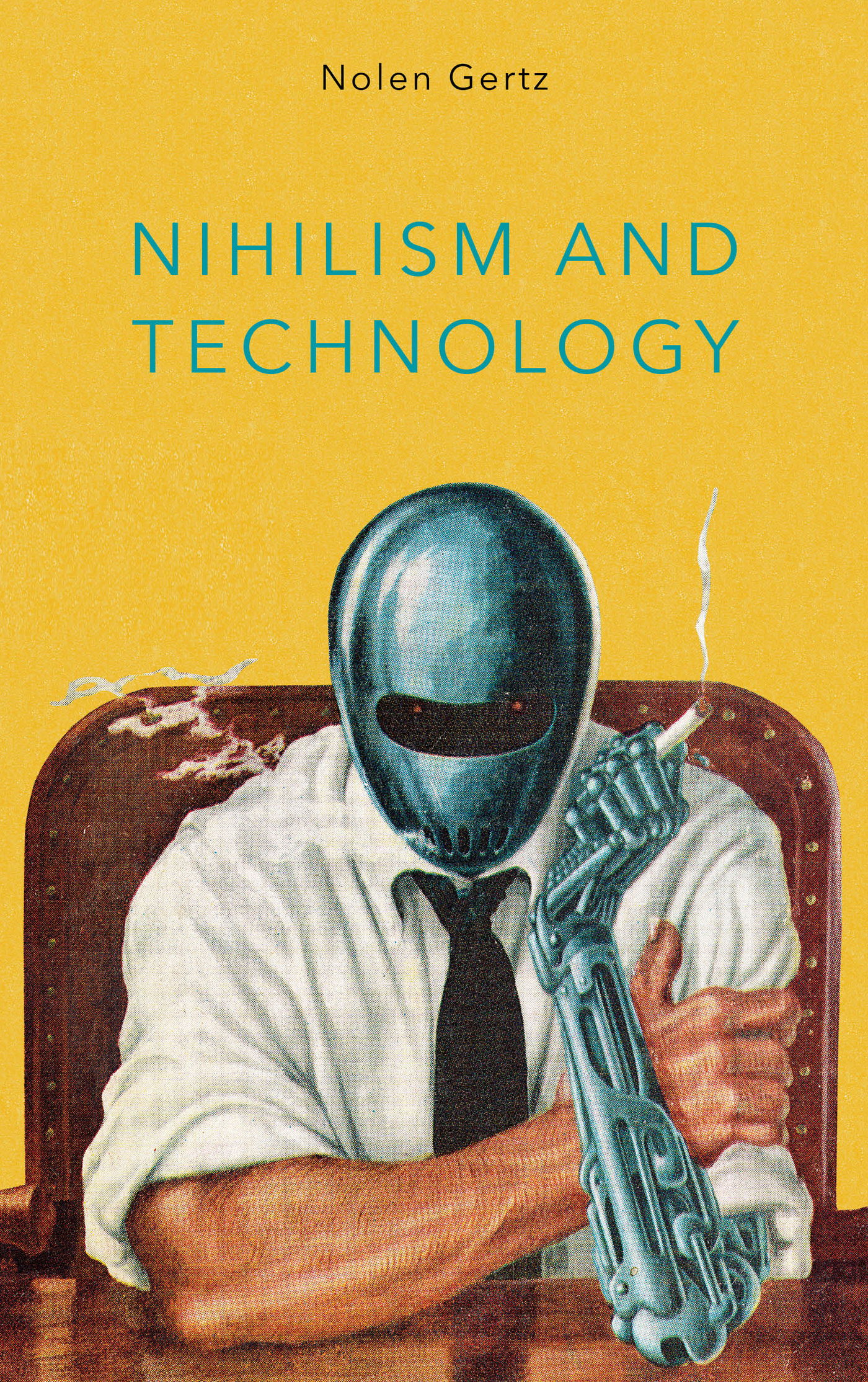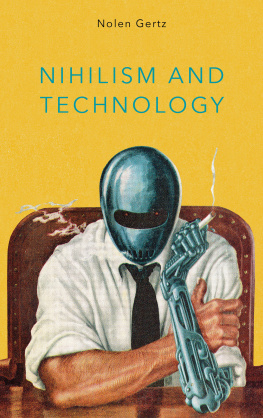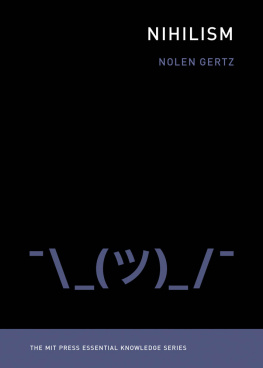Nolen Gertz - Nihilism and Technology
Here you can read online Nolen Gertz - Nihilism and Technology full text of the book (entire story) in english for free. Download pdf and epub, get meaning, cover and reviews about this ebook. year: 2018, publisher: Rowman & Littlefield International, genre: Religion. Description of the work, (preface) as well as reviews are available. Best literature library LitArk.com created for fans of good reading and offers a wide selection of genres:
Romance novel
Science fiction
Adventure
Detective
Science
History
Home and family
Prose
Art
Politics
Computer
Non-fiction
Religion
Business
Children
Humor
Choose a favorite category and find really read worthwhile books. Enjoy immersion in the world of imagination, feel the emotions of the characters or learn something new for yourself, make an fascinating discovery.
- Book:Nihilism and Technology
- Author:
- Publisher:Rowman & Littlefield International
- Genre:
- Year:2018
- Rating:3 / 5
- Favourites:Add to favourites
- Your mark:
- 60
- 1
- 2
- 3
- 4
- 5
Nihilism and Technology: summary, description and annotation
We offer to read an annotation, description, summary or preface (depends on what the author of the book "Nihilism and Technology" wrote himself). If you haven't found the necessary information about the book — write in the comments, we will try to find it.
Nihilism and Technology — read online for free the complete book (whole text) full work
Below is the text of the book, divided by pages. System saving the place of the last page read, allows you to conveniently read the book "Nihilism and Technology" online for free, without having to search again every time where you left off. Put a bookmark, and you can go to the page where you finished reading at any time.
Font size:
Interval:
Bookmark:
Nihilism and Technology
Nihilism and Technology
Nolen Gertz

London New York
Published by Rowman & Littlefield International, Ltd.
Unit A, Whitacre Mews, 26-34 Stannary Street, London SE11 4AB
www.rowmaninternational.com
Rowman & Littlefield International, Ltd. is an affiliate of
Rowman & Littlefield
4501 Forbes Boulevard, Suite 200, Lanham, Maryland 20706, USA
With additional offices in Boulder, New York, Toronto (Canada), and London (UK)
www.rowman.com
Copyright 2018 by Nolen Gertz
All rights reserved. No part of this book may be reproduced in any form or by any electronic or mechanical means, including information storage and retrieval systems, without written permission from the publisher, except by a reviewer who may quote passages in a review.
British Library Cataloguing in Publication Information
A catalogue record for this book is available from the British Library
ISBN: HB 978-1-78660-702-7
ISBN: PB 978-1-78660-703-4
Library of Congress Cataloging-in-Publication Data
Names: Gertz, Nolen, author.
Title: Nihilism and technology / Nolen Gertz.
Description: Lanham : Rowman & Littlefield International, 2018. | Includes bibliographical references and index.
Identifiers: LCCN 2018022468 (print) | LCCN 2018024763 (ebook) | ISBN 9781786607041 (Electronic) | ISBN 9781786607027 (cloth : alk. paper) | ISBN 9781786607034 (pbk. : alk. paper)
Subjects: LCSH: Technology--Philosophy. | Technology--Social aspects. | Nihilism.
Classification: LCC T14 (ebook) | LCC T14 .G38 2018 (print) | DDC 601--dc23
LC record available at https://lccn.loc.gov/2018022468
 TM The paper used in this publication meets the minimum requirements of American National Standard for Information Sciences Permanence of Paper for Printed Library Materials, ANSI/NISO Z39.48-1992.
TM The paper used in this publication meets the minimum requirements of American National Standard for Information Sciences Permanence of Paper for Printed Library Materials, ANSI/NISO Z39.48-1992.
Printed in the United States of America

This book is the result of my work at the University of Twente, and the result of my nihilism. With regard to the former, this book grew out of the vast variety of perspectives on technology that I have been able to engage with at UT. Teaching in modules in departments as varied as Industrial Design, European Public Administration, Communication Science, and Philosophy of Science, Technology, and Society has allowed me to discuss and develop my ideas with students and faculty who have a wide range of backgrounds and expertise. It was particularly illuminating to see firsthand how UT students and faculty were able to so thoroughly diagnose the dangers created by technologies in the past and in the present, and yet so optimistically, and so consistently, prescribe the development of new technologies and of new technology policies to avoid such dangerous situations in the future.
That we are technological beings living in a technological world was rarely if ever questioned, as instead the primary question students and faculty both sought to answer was how to make our technological world better. It was in response to the optimism required to have such a single-minded focus on technological solutionsa focus that, again, I found to be consistent even though the people holding this view came from such different backgrounds and areas of expertisethat I began questioning my own relationship to technology. For while I taught the techno-pessimism of thinkers like Martin Heidegger, Jacques Ellul, and Lewis Mumford, I nevertheless chose to teach these thinkers by using PowerPoint, using Word, using Google, using Blackboardby using technology. Consequently I was made more and more sympathetic to the view that technologies are fundamental to what it means to be human, that technologies mediate our relationships to ourselves and to the world, and that we should investigate technological mediations in order to shape them rather than merely be shaped by them.
However, thanks perhaps to my training at the New School for Social Research, I could not avoid my nagging suspicion that there was something wrong with this techno-optimism. While I came increasingly to rely on technologies in my personal and professional life, I yet did not feel optimistic about my relationship to technologies. I did not enjoy relying on FaceTime to connect with my brother and sister. It is often like a chore to use Twitter to try to keep up with current events. I was never confident in my decision to use PowerPoint slides, slides filled with pop culture references found on Google Images, as a way to engage with students. Such technologies were a ubiquitous part of my daily life, but that felt less like a welcome development than simply a fact of life that could not be avoided. I did not love technologies. I did not hate technologies. I merely acquiesced to a life lived with technologies and through technologies.
At the same time I found myself more and more invested in trying to keep my son away from technologies, in trying to get my son outside as much as possible, in trying to get my son to prefer forests over Frozen and playgrounds over PAW Patrol. I knew my son liked technologies and that I could not prevent him from using technologies. I also knew that familiarity with technologies could only help him to advance in our technological world. But he wanted to use technologies a little too much. He got a little too upset when I took them away. He could be a little too absorbed in the technologies he was using. And it often felt a little too easy for me to turn to technologies as a way to solve parenting problems. In other words, I did not want my son to become as dependent on technologies as I had.
Thanks to these conflicting experiences I came to realize that my concern over techno-optimism was less about whether we are wrong to seek technological solutions to our problems and more about whether we are wrong to see so much of life as problems. For to view an experience as a problem is to be led to seek a solution, a solution to that experience, a solution that would help us to avoid again having such an experience. Further, to view a technology as such a solution is to view a technology as a way to avoid certain experiences, to avoid experiences viewed as problematic. But once we discover that technologies can help us to avoid problematic experiences, it is hard not to make the further discovery that technologies can also help us to avoid undesirable experiences. Consequently, we are led to the final discovery, that technologies can even help us to tailor experiences to our desires. In this way trying to solve a problem, a problem like not wanting to take the bus to get to work, becomes trying to raise money for a start-up devoted to disruptingcommuting, devoted to the vision of a world where no one ever has to take a bus again.
It may seem at first like there is nothing wrong with such a vision, with such disruption, with such a problem-solving mindset. But the issue is how this mindset can lead us toward techno-utopianism rather than toward self-discovery, rather than toward asking ourselves why we would find an experience like riding a bus to be a problem in the first place. To seek solutions to problems is to be able to avoid not only the recurrence of the problem but to be able to avoid reflection, as we are not led to ask questions about experiences if we are no longer having the experiences. Using technologies to try to create a problem-free world, a world where we can avoid problematic and undesirable experiences, can also be seen therefore as using technologies to try to create a reflection-free world, a world where we can avoid problematic and undesirable questions.
Next pageFont size:
Interval:
Bookmark:
Similar books «Nihilism and Technology»
Look at similar books to Nihilism and Technology. We have selected literature similar in name and meaning in the hope of providing readers with more options to find new, interesting, not yet read works.
Discussion, reviews of the book Nihilism and Technology and just readers' own opinions. Leave your comments, write what you think about the work, its meaning or the main characters. Specify what exactly you liked and what you didn't like, and why you think so.











